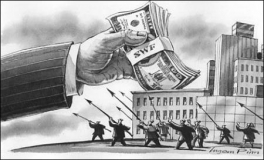The State in Capitalism

By Adam Dixon, University of Bristol
BRISTOL: 24 May 2013 - Often underlying the concern in the West with the rise of sovereign wealth funds, or, for that matter, any accumulation of financial power by some public entity (e.g. a public-employee pension fund or a state-owned enterprise), is the intrinsic link such entities have with the state. There is a perception that this link is incompatible with free-market capitalism. If not always an explicit argument, sceptics fear that such state-sponsored entities, even if there is a high degree of organisational and political separation from the decision-makers of these entities, will ultimately contravene ‘free’ market processes of exchange to the benefit of the political will. In a space that ‘should’ be limited to only private actors, this interference is ultimately inefficient. By this logic, such entities contravene the ‘spirit of capitalism’, and are therefore seen as threatening.
Unfortunately, such sceptics seem to forget or ignore that markets are inherently political: in the history of capitalism over the last 150 years the state has had a key role in ensuring capitalist processes, whether explicitly or implicitly. The state sets many of the ‘rules of the game’ through regulation, and is usually there to provide public goods to the economy that are necessary for the rest of the capitalist system to operate. No successful developed market economy is without a relatively strong state. The global financial crisis of the last decade reminded us that even in the most so-called free markets of global capitalism, the state is always waiting in the shadows to rescue capitalism from its excesses and failures. The state is likely to continue to do so even to the chagrin of free-market purists, because it always has done. Most political leaders are unwilling to sit back and see what happens if action is not taken, even if the moral hazard is clear.
Following the collapse of Lehman Brothers in September 2008 it was not uncommon to hear fearful pronouncements that capitalism could soon be replaced, that the emerging markets that had embraced capitalism as a means to organise their economies over the last several decades would revert to their old ways. The spectre of socialism was knocking on the door, or was it? Like most crises, many forget that capitalism oscillates between booms and busts (to varying degrees), as it always has done. But it was not so much a fear of a return to socialism, but a fear of a return of the state. Yet if one is reminded that the state is a part of the process (even in the freest of markets), then a more visible state is not necessarily counter to a properly functioning free market, or the continuing existence of one. The state may have to periodically show its face, but it is still firmly in almost all countries on the side of capitalism.
That the majority of sovereign wealth funds are in emerging markets is not just a product of global imbalances and high commodity prices of the last decade; they are an expression of the embrace of market capitalism since the end of colonial rule and the collapse of the Iron Curtain. Since the crisis began, more and more countries have established or are in the process of establishing their own sovereign wealth funds. Given sovereign wealth funds are by nature capitalist entities in pursuit of the profits of global capitalism, this development is further confirmation that capitalism remains strong, with states (not surprisingly) leading the way.

